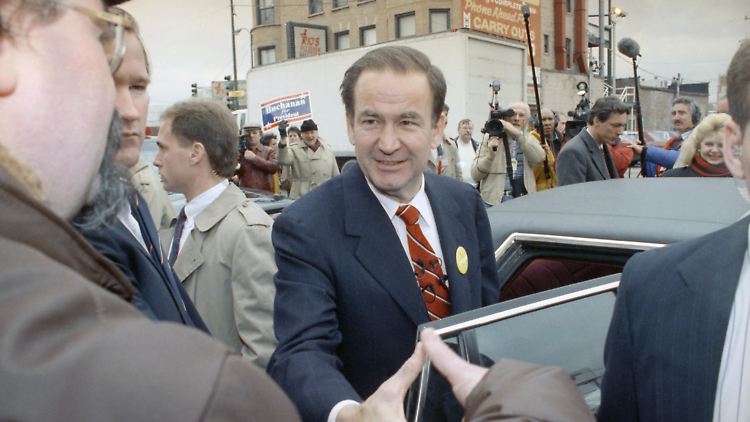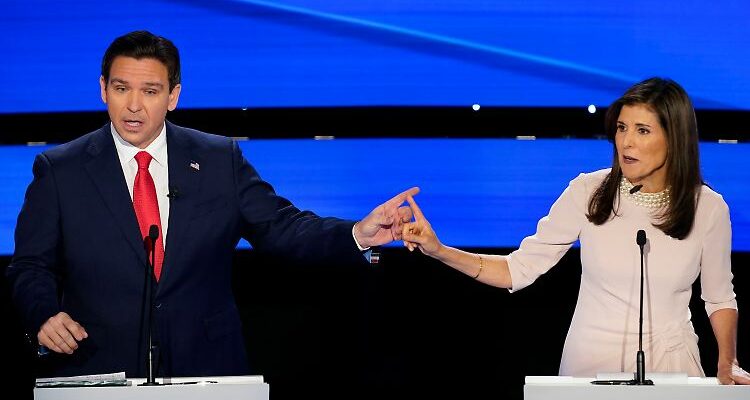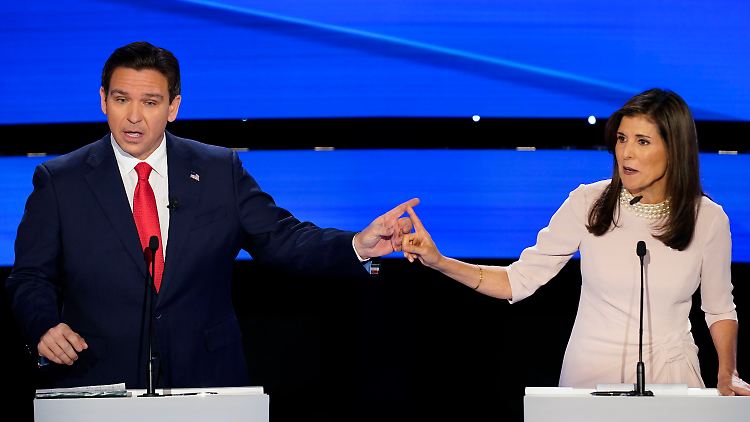Fateful year for the USA
So Trump became almost untouchable
By Roland Peters
January 14, 2024, 4:04 p.m
Listen to article
This audio version was artificially generated. More info | Send feedback
He is the Republicans’ overwhelming favorite to run. Donald Trump took advantage of what had been brewing in the party for a long time. Now he has it in his hand. Will it stay that way in 2024 or has its time already come?
“I think it’s a great honor that I’m being impeached for you,” said Donald Trump on a stage in the US state of New Hampshire. The crowd cheers, a man shouts: “We love you!” The ex-president points to him and thanks him. It’s just before Christmas 2023. The Republican primaries will begin in four weeks. Trump is trying to turn the total of 91 charges against him in various trials into more support: I’m fighting for you. In surveys he is miles ahead of his competitors.
Nothing has changed so far; he leads with more than 60 percent, almost 50 points ahead of the second-placed team. With this national poll average, Trump towers above all other candidates for the conservative presidential nomination. Anything other than a repeat of his duel with Democrat Joe Biden in November would be a huge surprise. Trump is not invulnerable, but he clearly dominates the conservative electorate. The election year 2024 is a year of fate. It begins with the Iowa state primary on January 15th.
For the world, this is about possible scenarios of how the USA will behave in global crises and wars. Will the superpower continue to send aid to Ukraine? What is happening in the Middle East? How does it plan to limit the growing influence of authoritarian regimes? Trump is a fan of staying out of conflict and bowing to international obligations as little as possible. His Republican competitors have different positions. Nikki Haley, for example, sees the world similarly to Biden: Russia must be stopped. Ron DeSantis is much closer to Trump, but is maneuvering.
For the USA, the election year is also about domestic policy priorities. What is happening to immigration from the southern border with Mexico? Is the transition to renewable energies continuing? And finally, 2024 will be the year of decision for the Republicans. Will Trump remain your dominant figure or can someone overthrow him – and take over his wing? Trump has built up a stable power base among voters and within the party over several years. It was and is a product of the conditions, not their cause.
Buchanan, Palin – Trump
A look back at the past 15 years shows how this came about. Trump was able to turn the party to the right in just a few years because he proved that Republicans need more than free trade, political decency and conservatism to excite their potential voters. Aggressiveness has become more important. The Tea Party, the arch-conservative movement that emerged with Sarah Palin as its standard bearer in 2009, paved the way for this development.
Palin was a spearhead for Trump, writes Jeremy Peters in his book “Insurgency: How Republicans Lost Their Party And Got Everything They Ever Wanted.” She broke a taboo when, as John McCain’s running mate in the 2008 presidential election campaign, she turned a lie about Obamacare into a political weapon. She claimed that in what she called death panels, decisions were made about who appeared to be worth living. This was complete nonsense, as it involved a budget for advice on euthanasia for incurable patients. But it worked: the lie became the perceived truth.
Palin and McCain lost to the young Senator Barack Obama. But Palin, with her confrontational manner, was much more popular with Republicans than the Vietnam veteran McCain, who even defended his competitor during a speech with voters. He was booed for that. A memorable scene and something that wouldn’t happen to Trump. The author highlights something else: Palin adopted the derogatory term “Valley Trash” about her origins and proudly used it for herself. It was a self-empowerment.


Pat Buchanan, an adviser to several Republican presidents, tried to get into the White House himself in 1992.
(Photo: AP)
The radicalization of Republicans had already begun before, for example with Barry Goldwater in the 1960s or Newt Gingrich in the 1980s, when he vigorously and publicly blocked compromises in Congress and helped colleagues to speak more aggressively. In the 1992 presidential election, the arch-conservative Pat Buchanan challenged the incumbent (Republican) head of state George Bush – an affront because the incumbent practically has the right of pre-emption to run for a second term.
Culture war for decades
Buchanan failed and became Bush’s running mate. But he called out the fundamental conflict against the Democrats that brought Trump into office in 2016. At the Republican nomination convention, he said urgently to a strangely silent audience, as if sensing the significance of the moment: “A religious war is going on in this country. It’s a culture war.” This is just as important for the USA as the Cold War that had only recently ended. “It’s about the soul of America, and the Clintons are on the other side.” The Democrat Bill Clinton won the presidency, but the basic dynamic for the upheaval from the right was in place: us against them, no compromises.
Trump built on this in 2015 and won the party over, says Jeremy Peters. In television debates he drove his competitors ahead of him, his improvised appearance without a sense of political correctness made him appear as the one who represented the interests of the common people, the forgotten, the imperfect. The other politicians were interchangeable. Not Trump. He gave and still gives his speeches largely freely; led by the anger of voters who feel better by defining clear enemy images.
Today we can see where this has led the party. A large part of the population reveres Trump because he brought the Republicans a historic success: During his term in office, he had the Supreme Court justices installed who overturned the federal abortion law. The conservatives had been consumed by this issue for four decades.
Competitor DeSantis is positioning himself in the culture war as a young commander who wants to take over Trump’s legacy. However, the ex-president would have to resign to do so; It’s hard to imagine him voluntarily stepping into the second row. Courts could still stop Trump. Or one of the other four candidates achieves such a surprise success in one of the first primaries that Trump is no longer considered the safe presidential candidate. At some point Trump’s time will come.

